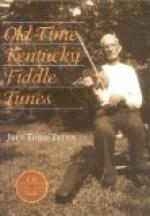What did the mountain-country want of railroads? What did it want of towns? The railroads would but bring more interlopers and in the towns they would foregather, arrogant in their firm determination to force upon the men who had first claimed the country their artificial rules and regulations. Timid in their fear of those they sought to furtively dislodge and of the rough love these men showed of a liberty including license, they would huddle in their storied buildings, crowd in their trammelled streets, work and worry in their little offices absurdly, harmfully to the rights of proper men. Like other mountaineers Joe had small realization of the advantages of easy interchange of thought and the quick commerce which come with aggregation. He thought the concentration of the townsfolk was a sign of an unmanly dread of those first settlers whom they wished to drive away unjustly, subjugate and ruin.
Throughout the mountains blazed a fierce resentment of the railroad builders’ presence and their work; in no heart did it burn more fiercely than in poor Joe Lorey’s, for the fear obsessed him that a member of the army of invaders had succeeded in depriving him of the last chance of getting that which, among all things on earth, he longed for most—Madge Brierly’s love. He did not stop to think that before the “foreigner” had come the girl had more than once refused to marry him, begging him to remain her good, kind friend. Such episodes, in those days, had not in the least disheartened him. He had always thought that in the end the girl would “have him.” But now he was convinced his chance was gone, his last hope vanished. The “foreigner” had fascinated Madge, made him look cheap and coarse, uncouth and undesirable.
As he had walked along the roads which, later in the morning, Madge had followed, he had frowned blackly at the sunrise and the waking birds, kicked viciously at little sticks and stones which chanced along his way. Never a smile had he for chattering squirrel or scampering chipmunk; fierce, repellant was the brown brow of the mountaineer, despite the glory of the morning, and black the heart within him with sheer hatred of Frank Layson and the class he represented.
His journey was much longer than the girl’s, for it did not end till he had reached the rude construction camp of the advancing railroad builders in the valley far below the little mountain-store. There he gazed at what was going on with a child’s wonder, which, at first, almost made him lose his memory of what he thought his wrongs, but, later, aggravated it by emphasizing in his mind his own great ignorance.
Through a tiny temporary town of corrugated iron shanties, crude log-and-brush and rough-plank sheds, white canvas tents, ran the raw, heaped earth of the embankment. About it swarmed a thousand swarthy laborers, chattering in a tongue less easy to his ears than the harsh scoldings of the squirrels he had seen while on his way. Back behind them stretched two lines of shining rails, which, even as he watched, advanced, advanced on the embankment, being firmly spiked upon their cross-ties so as to form a highway for the cars which brought more dirt, more dirt, more dirt to send the raw embankment on ahead of them.




